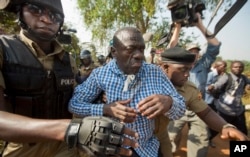Uganda’s Supreme Court Thursday upheld the re-election of President Yoweri Museveni in the February 18 national poll. The court rejected a petition brought by former Prime Minister and presidential candidate Amama Mbabazi.
The electoral commission announced on February 20 that Museveni had won 60 percent of the vote to opposition challenger Kizza Besigye’s 30.5 percent.
Mbabazi had asked the court to nullify the results on the grounds the electoral commission did not adhere to the country’s electoral laws. But the court noted that while there were some irregularities, they did not affect the final results of the election to justify annulment.
Retired major general Jim Muhwezi, Uganda’s minister of information and national guidance, said the Supreme Court ruling confirms the choice of Ugandans when they re-elected President Museveni. “The government, of course, is very happy because it has confirmed what we knew very well, that the people of Uganda had expressed their choice and President Museveni won the election by over 50 percent. So the Supreme Court has confirmed what we believe,” Muhwezi said.
Muhwezi said it is up to Museveni and the opposition to heal and reunite the country now that the courts have spoken.
“That is true that the responsibility is with the president and the government as it was when he took up arms and liberated this country and has done everything to bring to what it is today. It still remains his responsibility to bring everybody together. But it’s also the responsibility of anybody who takes upon himself to lead the people. The leader of the biggest opposition group also has the responsibility to make sure that he contributes to that process of unifying the country,” Muhwezi said.
Uganda’s main opposition leader and former presidential candidate, Dr. Kizza Besigye of the Forum for Democratic Change, said no process can legitimize Museveni's re-election. Besigye, who has been under house arrest for than more 40 days since the election, said the Ugandan judiciary could not have delivered an impartial ruling because its independence has been compromised.
“Pretty much what I had expected and that is because of a number of reasons. First and foremost, every petition, even in the best of circumstances is faced with very many obstacles against a petitioner because a petitioner in an election has only 10 days to prepare and present a petition in court. But these are not the best circumstances. We are talking about a situation where there is heavy intimidation of the citizenry, and anybody who purports to be a witness. But over and beyond that, we have the challenge of our institutions including the courts,” Besigye said.
Mbabazi, who brought the petition, told journalists after the court ruling that the struggle for democracy in Uganda will continue. The former prime minister said he will “continue to pursue the idea of reforming the law so that the petitioner is given enough time to gather and present enough evidence in court.”
Besigye said as a second runner up in the February 18 election, he would have been the right person to challenge the results. But he said he couldn’t because Ugandan police have held him under house arrest for more than 40 days since the election.
But information Minister Muhwezi denied Besigye is under house arrest. He said the police have been constructively engaging Besigye at his home in line with Uganda’s Public Order Management Act because Besigye has said he wants to defy the laws and march on Kampala city to cause violence.
“If you’ve been following the events both before and after the election, Dr. Besigye has been declaring and saying openly that he is going to defy the laws of the country. So all the police have been doing is just keeping under surveillance because of what the police know that when Dr. Besigye moves, he wants to create crowd and cause public disorder. That is all, but he’s not under house arrest. His movements are being monitored and regulated by the police,” Muhwezi said.

